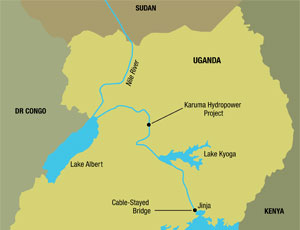Uganda is preparing to start construction of two multibillion-dollar projects on the Nile River, despite complaints by Egypt that one of the projects will reduce Egypt’s share of the river’s water. Further, Egypt claims that a colonial-era treaty gives it the power to veto the project.

The news regarding construction of the $1.2-billion Karuma hydropower project and a $125-million bridge comes eight months after the May 14, 2010, signing of the Cooperative Framework Agreement. The CFA is a new arrangement within the Nile basin countries— including Uganda, Kenya, Rwanda, Tanzania, Ethiopia and the Democratic Republic of the Congo—for an equal share of the water from the 5,584-kilometer-long Nile River.
Egypt and Sudan refused to sign the agreement, demanding more time to reach a consensus on every clause as well as the deletion of the equal-sharing provision.
Egypt claims right to 87% of the Nile River water, based on a treaty signed by Egypt and Britain in 1929. That treaty also gave Egypt the right to veto any project by any of the Nile riparian states to divert water for irrigation or hydropower generation.
“Egypt’s share [of Nile water] is controlled by international treaties and conventions that organize the share of each country,” Mohamed Nasreddin Allam, the Egyptian minister of irrigation and water resources, said in a statement. “Egypt reserves the right to take whatever course it sees suitable to safeguard its share.”
Uganda confirmed last month the completion of a feasibility study for the Karuma powerplant by New Delhi-based Energy Infratech Pvt Ltd. The project will be financed by the Ugandan government through its Energy Investment Fund, which was set up four years ago. The plant will be managed by the Central Bank of Uganda, although James Baanabes, the commissioner for energy resources, said in December that the country will seek additional financial support from development partners, whom he did not name.
Baanabes says the Karuma plant will harness 19 km of the river. An earlier design prepared in 2006 by Norway’s Norpak Power Ltd. has been revised to increase capacity to 650 megawatts from 250 megawatts.
At least 28 international and local construction firms, led by Italy-based Salini Costruttori SpA. and Canada-based Lonsdale, have expressed interest in the project. Construction is scheduled to start in the second quarter of this year.
Uganda also is building a cable-stayed toll bridge across the Nile at a total length of 525 meters. An invitation for consultancy services is expected in August, with the tender announcement for construction contractors expected in July 2012, according to project time lines produced by Uganda’s Ministry of Works and Transport.
The bridge is sited on a 300-meter-wide stretch of the Nile in the city of Jinja. Its main-span deck will be made of concrete supported by 70-m-high pylons connected by heavy steel cable stays, according to the bridge’s engineer, Jonathan Tulum, of the Uganda National Roads Authority.
Financing was secured in December after Japan loaned $100 million for the four-year construction project. The government will provide the additional $25-million loan.
Tulum says the bridge, designed for a 120-year service life, will link Uganda and landlocked neighboring countries to the Northern Corridor Route, a highway and rail route running from the Democratic Republic of Congo to Rwanda, Burundi and Uganda that ends in Kenya at the Indian Ocean port of Mombasa.


Post a comment to this article
Report Abusive Comment